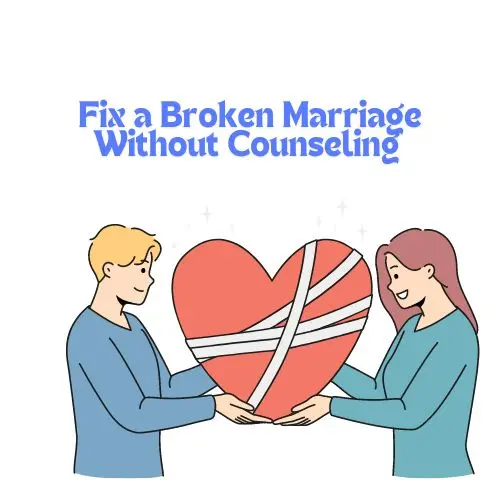Introduction
During a marriage, there is give and take; sometimes, couples feel like they have reached the lowest point possible. Although counseling has been known to help some partners, it is not embraced by everyone, nor is it affordable for all who may need professional marriage counseling. Nonetheless, you can still do a lot on your own to rekindle your marriage. A broken marriage can be mended by working hard, appreciating each other’s differences, bargaining and promising to improve things without intervention from therapy sessions.
Key Statistics on Broken Marriages and Relationship Help-Seeking
| Statistic | Figure |
|---|---|
| Percentage of first marriages that end in divorce | Approximately 41℅ of first marriages end in divorce. (Womenonguard) |
| Median Duration of Marriages Ending in Divorce | First Marriages: The median duration of first marriages that end in divorce is 8 years. |
| Percentage of distressed couples that choose to get help | 30-37% |
| Percentage of couples reporting significant relationship improvements after therapy | 70-75% |
This overview shows that while relationship struggles are incredibly common, most couples in distress do not seek outside help. However, for those who engage in counselling, it is usually successful in improving the relationship. Keep this context in mind when considering options for improving your own marriage.
Step 1: Identify Core Issues and Conflict Triggers
Before attempting to resolve problems in your marriage, you need to identify the core underlying issues and what tends to trigger arguments and conflict between you and your spouse.
- Common core issues – Lack of intimacy, trust issues due to infidelity, poor communication, unresolved differences, financial disagreements, lack of shared interests, and challenging life changes.
- Common triggers – Criticism, defensiveness, contempt/disrespect, stonewalling during conflict, infidelity, lack of appreciation.
Reflect on your relationship history and current status – what foundational issues or triggers stand out to you as causing distress in your marriage? Recognizing these areas will help focus your efforts.
Step 2: Take Ownership for Your Contribution

The tendency when relationships crumble is to blame your partner. However, personal accountability is key – you must recognize your own role in any issues. Taking responsibility empowers you to implement changes and influence the dynamic from your end.
- What behaviours, attitudes or choices have you exhibited that may have contributed to strain?
- What efforts have you made to understand your partner’s perspective?
- What steps can you take personally toward improving this relationship?
This introspection and ownership for change is challenging but absolutely vital. Do not stay stuck blaming your spouse – you have the power to impact this marriage if you take personal responsibility positively.
Step 3: Rebuild Intimacy Through Shared Experiences
Losing an emotional connection with your spouse can happen gradually over many months or years. Setting aside regular quality time together helps rekindle intimacy and affection.
- Schedule weekly date nights (no phones or screens!)
- Explore new activities that provide joy and adventure
- Identify shared interests to engage in as a couple
- Travel somewhere new together when possible
Actively creating positive joint experiences generates relationship satisfaction, helping move you beyond simply co-existing to enjoying each other’s company.
Step 4: Improve Communication and Understanding

A lack of mutual understanding or inability to communicate without escalating into arguments can quickly degrade a marriage. Learning tools to foster insight and constructive discussion is essential.
- Make time for open conversations about your relationship
- Learn your partner’s communication style and adjust to connect
- When emotions heighten, take a break before continuing discussions
- Use active listening techniques like paraphrasing what you hear
- Ask thoughtful questions instead of making assumptions
Developing emotional intelligence and employing strategies like these can help you break free from patterns of miscommunication, criticism or contempt during conflict.
Step 5: Address Differences with Empathy & Compromise
Another roadblock many couples encounter is struggling to accept each other’s differences – whether conflicting personalities, perspectives on finances or intimacy needs. Bridging these gaps requires compromise.
- Discuss differences openly with empathy about why you feel the way you do
- Look for win-win compromises where both partners’ core needs are met
- Agree on reasonable changes or boundaries you’re both willing to implement
- Check-in regularly to evaluate if adjustments are working for both of you
Navigating differences may involve trial and error. The key is maintaining empathy, patience and respect throughout the process.
Step 6: Seek Input from Trusted Social Supports

While you don’t need formal therapy, confiding in close friends or family members you trust about challenges in your marriage can help gain outside perspective.
- Provide factual details without blame about issues in your relationship
- Ask for insights into growth areas or contributions they observe
- Inquire about strengths they see in each of you or your marriage
- See if they have ideas for reasonable steps forward they would recommend
Having candid conversations with loved ones who know you both well can uncover blind spots, provide support, and impart wisdom during difficult times.
Step 7: Cultivate Shared Values and Vision
Reconnecting with your core values and vision for your life together can act as an anchor when facing relationship struggles.
- Discuss your individual life missions and goals for the future
- Find alignment in values you have in common at your foundation
- Co-author a shared mission statement encompassing joint priorities and hopes
- Continue referring back to this when encountering conflict or losing your way
Building unity and a shared vision for your marriage will help strengthen your commitment and intentionality to move forward in a positive direction.
Step 8: Seek Out Faith-Based Resources

For couples with shared faith, turning to religious communities or spiritual practices may provide guidance, encouragement and relationship education without formal counselling.
- Attend marriage enrichment classes at your place of worship
- Meet with faith leaders like priests, pastors or mentors
- Read sacred texts and books by spiritual leaders on marriage
- Incorporate prayer, meditation or spiritual rituals into your life
If faith is important to both of you, putting spiritual principles into practice in your marriage may offer renewed purpose, wisdom and power to transform your relationship struggles.
Step 9: Enlist Support for Practical Needs
Infusing practical help, resources, or services can sometimes ease surface-level strains that worsen underlying issues.
- Ask parents/friends to babysit so you can spend intentional time
- Look into relationship workshops or marriage retreats
- If financial stress is a factor, meet with a financial advisor
Adding practical support in key areas can provide relief and margin so you can focus on connecting with each other.
Step 10: Stay Committed to Ongoing Efforts
Don’t expect that a single conversation or attempt at reconciliation will instantly fix everything. Real change takes many ongoing, difficult conversations and continued intentional efforts over an extended time.
- Commit to a 6-12 month intensive relationship improvement plan
- Meet regularly to work through relationship exercises together
- Continue setting aside hours each week to invest in each other
- Persevere even when progress feels slow or stalled
Repairing a damaged marriage takes both partners’ tremendous vulnerability, grit and perseverance. But many couples testify that the investment yielded substantial rewards for themselves, their kids and their future together.
In Conclusion
Without the guided assistance of a trained therapist, improving a distressed marriage will be more challenging. However, by taking ownership for your contributions, implementing tailored changes based on the specific issues you face, enlisting support from trusted friends or faith communities, and committing to stick it out through ups and downs – you can experience genuine renewal in your relationship. Regaining fondness and unity takes humility, creativity, and tremendous effort – but many couples demonstrate that the hard work is well worth it in the long run.

